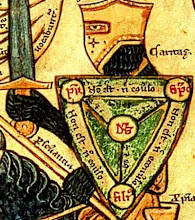“Do
your best to present yourself to God as one approved, a worker who has no need
to be ashamed, rightly handling the word
of truth.” (2 Timothy 2:15) [1]
To
be worthy workers of God, we are to “rightly [handle] the word of truth.” In
the King James Version, that last clause of the verse is translated “rightly
dividing the word of truth.” In his “How to Study the Bible,” Dr. John
MacArthur, Jr. wrote
The
words “rightly dividing” mean literally “to cut it straight.” Paul made tents;
he used these words because he made tents out of goatskins, and he had to cut
the hides properly so they would fit together. Paul said you have “to cut
straight” every portion of Scripture or the whole doesn’t come together. You
can’t make sense out of the whole unless you know what to do with the parts.
You must cut every portion of the Word of God straight and then fit the whole
together.
Is
the Iglesia ni Cristo (INC) rightly
handling the Word? Apparently, they often fail to do so.
The
Iglesia ni Cristo unashamedly uses a
proof-text method of handling Scripture. It knows which doctrines it especially
needs to defend and seeks verses and parts of verses to defend them, often
completely disregarding the context.[2]
When
we disregard the context of a verse or parts of it, we are not cutting it
straight. In doing so, “the whole counsel of God” (Acts 20:27b) does not come
together and we won’t make sense out of that whole because of what we did with
its parts.
 |
When we fail “to cut it straight,” the Bible would end up looking like this.
(Photo from Letter of Marque) |
The
INC has cut the Word crooked, not straight. One example is the way they make it
appear that Christ denied His deity in Luke 24:39.
The
other disciples made a mistake in believing that Jesus was spirit when he was
resurrected from death. Jesus, however, corrected their error: “And He said to them, ‘Why are you troubled, and why do doubts arise in your hearts? See My hands and My feet, that it is I Myself; touch me and see, for a spirit does not have flesh and bones as you see that I have’.” (Lk. 24:38-39, New American Standard Bible) Since “God is spirit” (Jn. 4:24) and Jesus Christ isn’t, then Jesus Christ is not God.[3]
Note that they tried to fit together John 4:24 and Luke 24:39 to make it appear that Jesus denied His deity in the latter verse.
I agree that “God is spirit” (John 4:24). I also agree that our Lord Jesus showed that He has “flesh and bones” which “a spirit does not have”. But I disagree with the INC’s conclusion that, in denying that He is spirit in Luke 24:39, Jesus denied that He is God.
The meaning of a word depends on its context. Even if both John 4:24 and Luke 24:39 have the word “spirit,” that does not mean that they used the word the same way. The context of John 4 is worship while that of Luke 24 is the resurrection. So, the way Jesus used the word “spirit” in John 4:24 is different from the way He used that same word in Luke 24:39.
In John 4, the Lord responded to what the Samaritan woman said: “Our fathers worshiped on this mountain, but you say that in Jerusalem is the place where people ought to worship.” (v. 20) He replied, “Woman, believe me, the hour is coming when neither on this mountain nor in Jerusalem will you worship the Father. … God is spirit, and those who worship him must worship in spirit and truth.” (Vv. 21, 24) Because God is spirit, “He is not confined to one location.”[4] The word “spirit” “is a declaration of His invisible nature.”[5]
But in Luke 24, the Lord appeared to the disciples after His resurrection. “But they were startled and frightened and thought they saw a spirit.” (v. 37) So, He said, “See my hands and my feet, that it is I myself. Touch me, and see. For a spirit does not have flesh and bones as you see that I have.” He was not denying His deity to them. He was convincing them that He indeed rose from the dead.
Jesus proved to His followers that He had really been resurrected. Not only did He stand in their presence so they could see Him and His wounds (vv. 39-40), but He also ate food (a piece of broiled fish) before them to show that He was not a ghost.[6]
That is why the New International Version translated it this way: “a ghost does not have flesh and bones, as you see I have.”
Our Lord Jesus did not actually say, “I am not God.” What he really said was, “I am not a ghost.” Thus, the INC did not rightly handle Luke 24:39.
© 2012 Bible Exposé Apologetics Ministry. To know more about us, click here.
________________________________
[1] All Bible verses are from the English Standard Version, unless otherwise noted. Emphasis added.
[2] Arthur Leonard Tuggy, Iglesia ni Cristo: A Study of Independent Church Dynamics (QC, Philippines: Conservative Baptist Publishing, 1976), 127.
[3] Tomas C. Catañgay, “That stubbon skeptic, Thomas,” Pasugo: God’s Message, April 2002, 7. Italics theirs.
[4] John A. Martin, “John” in The Bible Knowledge Commentary, New Testament, ed. John F. Walvoord, Roy B. Zuck and Dallas Theological Seminary (Wheaton, IL: Victor Books, 1983, 1985), 286.
[5] Ibid.
[6] Edwin A. Blum, “John” in The Bible Knowledge Commentary, New Testament, ed. John F. Walvoord, Roy B. Zuck and Dallas Theological Seminary (Wheaton, IL: Victor Books, 1983, 1985), 264.



<< Home